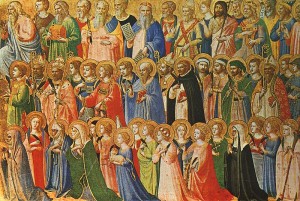In the 1970s Billy Joel wrote a hit song, “Only the Good Die Young.” The lyrics go like this (but I won’t sing them): “I’d rather laugh with the sinners than cry with the saints;/ the sinners are much more fun.”
Sinners can be saints, and saints are sinners. A saint is not a superhero, isn’t faster than a speeding bullet, more powerful than a locomotive, and able to leap tall buildings in a single bound. They do not possess superhuman powers. But these spiritual titans often receive superior abilities from God to carry out his plan in our church. Padre Pio was known to have received the gift of bilocation, could be seen in two places at once. The powerful intercession of the saints has changed the church and the world. Saints like Teresa of Avila and Joseph of Cupertino could pray so deeply they levitated, could defy gravity. Through the witness of the saints, God works miracles to show his power and his influence in the world.
PEOPLE LIKE US
These are extreme examples. Most saints were people like us, simple, humble, down to earth, focused on doing the will of God. We in the church revere—we do not worship—the saints because like them, we are human. Their failings, their challenges, and their successes in the faith make them saintly, and they are flesh and blood like us. To remind us of our humanity, God gives us limitations, challenges in our lives that, with the help of his grace, we can overcome and use to witness his power and his love to the entire world.
Everybody has a thorn in the flesh, so to speak. Our human limitations unite us in our faith and help us to think about God, and to seek his grace to overcome challenges in our lives.
THE COMMUNION OF SAINTS
On Sunday at Mass we profess our belief in the communion of saints when we pray the Creed. As Catholics, we honor the men and woman in the church who have created a legacy in the world by the power of their example—healings, martyrdom, miracles, writings and preaching, and their displays of piety.
Every century in Christianity has had its share of great spiritual masters. Saint Paul lived in the first century, and is a pillar of the church, but he was human like the rest of us. In his Second Letter to the Corinthians he writes of how God blessed him with mystical vision too deep to expression speech. But that Paul might not grow too proud of his spirituality, the Lord struck him with “a thorn in the side, an angel of Satan to beat me and to keep me from being prideful.”
From this mysterious ailment Paul suffered greatly. He begged the Lord to remove it from him that he might prosper but God refused. He said, “My grace is sufficient for you, for my power is made perfect in weakness” (2 Cor 12:9).
What was this mysterious ‘thorn in the side’ and why didn’t God rescue Paul? Scholars believe Paul was referring to a physical ailment, such as a limp or a speech impediment, or a scar, or lust, or the continual discouragement of being rejected by his own people the gospel that he preached.
Whatever was this ‘thorn,’ it provided constant irritation and sorrow for Paul. As the saying goes, that which does not kill us makes us stronger. Paul accepted the hardship of the malady he suffered as the key to everlasting peace, the key that unlocked for him the gates of heaven.
THE LOVE DOCTOR
The saints referred to Jesus as the Physician of the Soul. Doctors use medication and surgical instruments that cause temporary pain and suffering to bring about long-term health and recovery. A surgeon’s scalpel, if not used correctly, can cause great damage to the body. But in the hands of a skillful surgeon, a scalpel has the power to heal and to save lives.
Our human limitations can taste like a bitter pill we swallow because we think it will make us well. God permits us to suffer the pain of being human that he might show the world that he is real and that he is actively working his miracles through our lives.
Saint Patrick, the great Irish bishop, said, “Whether I receive good or ill, I give thanks to God, who taught me to trust in his mercy.”
As creatures of God we possess limitations. We are not God, but are human beings who possess limited capabilities. Christ humbled himself to share in our humnity by becoming one of us, so that we could share in his divinity. To receive him in the flesh is to live with him in the spirit, when no boundaries between heaven and earth exist. Saint Paul tells us that the thorn in his side reminded him of his weakness, of his need to rely upon God’s grace.
Our own thorns, whatever size or shape they may be, whatever part of the body they pierce, are not signs of God’s displeasure or anger, but show his wisdom and power and love in our lives. The thorns may be painful to endure and difficult to live with, but they make us think more about God and through them other people in the world know that God is with us to deliver us.
QUOD SCRIPSI SCRIPSI
